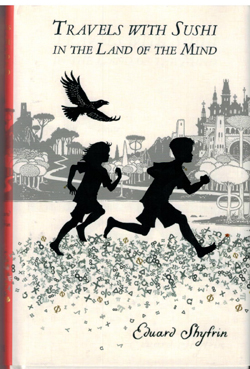 Travels with Sushi in the Land of the Mind by Eduard Shyfin, illustrations by Tomislav Tomic; White Rose Pubilshing, 2019, ISBN 9781912-802150, 188 pages; $19.99.
Travels with Sushi in the Land of the Mind by Eduard Shyfin, illustrations by Tomislav Tomic; White Rose Pubilshing, 2019, ISBN 9781912-802150, 188 pages; $19.99.

 SAN DIEGO — Siblings Aaron and Stella eat some magic sushi and they find themselves in the parallel universe of Mushi,The Land of the Mind, somewhat similar in concept on an updated, higher tech scale to what Alice found in Wonderland.
SAN DIEGO — Siblings Aaron and Stella eat some magic sushi and they find themselves in the parallel universe of Mushi,The Land of the Mind, somewhat similar in concept on an updated, higher tech scale to what Alice found in Wonderland.
In this parallel universe, many things are the same, but other things are quite different. Like a chess game, the world is divided into black and white spheres of influence, each presided over by a queen. Instead of knights, bishops, rooks, and pawns (and no king), the queens are aided in the Land of the Mind by various Lords and Ladies.
On the White Queen’s side are “will,” “wisdom,” “understanding,” “love,” “kindness,” “self-discipline,” “beauty,” “humility,” and “righteousness.” A formidable array to be sure.
However, the Black Queen, has powerful forces at her command. They include “flattery,” “self-justification,” “intolerance,” “fear,” “pride,” “indifference,” “betrayal” and “despair.”
In this world, energy and information are the stuff of life. If your energy drains, you can die; if your information is erased, you might as well die.
The people of both kingdoms are known as Mushi; the fierce soldiers are the Wasabi (a commentary on the hot paste that accompanies sushi).
In what seems like a parallel universe version of Gulliver’s Travels, war among the Mushi developed when an ancient king decreed that they should eat salmon sushi first, and tuna sushi second. The opposition said the order should be just the reverse. (Remember how the Lilliputians fought over which side to crack a hard-boiled egg?)
Among the tribes of Mushi caught up in the war were the one “which chose not to eat shrimp sushi” and was “almost wiped out by enemies.” Those must be Jews in the alternative reality. Some things, alas, don’t change.
Over all the Mushi, including the two queens, is The Supreme Ruler {The God of the Parallel Universe} who wants Stella and Aaron to venture through the Black Queen’s territory, rescue some of the White Queen’s chief lieutenants, and prevent energy from being totally drained from the white side to the dark side. They are to be accompanied by a knowledgeable raven, which can transform itself at any time into a particle or a wave. In ancient times, there had been a great flood in this parallel universe, and the raven (not a dove ) was the bird that had been able to return to the surviving Mushis with information about the condition of the world.
And so the siblings set off on an allegorical tale, which may remind you of the Odyssey, given all the strange creatures they encounter.
Along their way, Stella and Aaron, who are very bright, learn a smidgeon about such concepts as the value of Pi, quantum mechanics, and worm holes.
The tale is intended primarily for youngsters, but adults may enjoy all the sly references to our own world. What’s disappointing, in my opinion, but perhaps won’t be for young readers, are all the battles and killing that Aaron and Stella encounter on their journey. If the parallel universe were more perfect than our own, perhaps goodness and knowledge could have found other ways to overcome evil.
*
Donald H. Harrison is editor of San Diego Jewish World. He may be contacted via donald.harrison@sdjewishworld.com